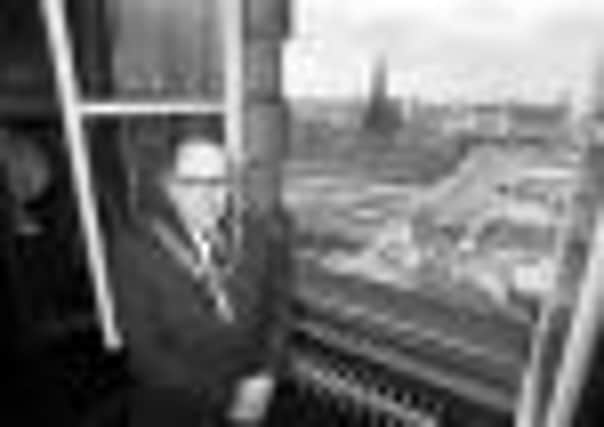Obituary: Dr John McKay CBE, socialist former Lord Provost of Edinburgh who boycotted 1986 Games over apartheid


EVERY Lord Provost of Edinburgh wants to leave their mark on the office and Dr John McKay, who died last week, was no different. But he was one of the few who managed to bequeath a legacy of principle and resolute defence for what he believed was right.
McKay was Lord Provost of Edinburgh between 1984 and 1988, a term that was defined by two interwoven strands: the Edinburgh Commonwealth Games of 1986 and the ongoing struggle against apartheid in South Africa.
Advertisement
Hide AdAdvertisement
Hide AdThe Games were hit by a boycott by many Asian, African and Caribbean countries angered by what was seen then as the Thatcher government’s tolerant approach to South African apartheid.
The boycott turned the Edinburgh Games into an almost all-white affair and put McKay, the Labour Lord Provost of the city, in a difficult position.
He decided he had to stick resolutely to his socialist principles and unite in solidarity with the boycotting nations – despite the damage this was doing to Edinburgh’s Games.
McKay hoisted the flag of the banned African National Congress from the City Chambers in Edinburgh, he laid flowers at the anti-apartheid Woman and Child memorial in Festival Square and he wrote personally to Margaret Thatcher, blaming her for the boycott and asking her not to come to the city during the Games.
After the Games were over and the city had been left with a financial black hole, largely as a result of the boycott, McKay then did his best to find a compromise and solutions to the debt crisis.
Apartheid emerged as another divisive issue in February 1988 when a South African, Frans Muller, was named as the referee for the Scotland France Five Nations rugby match at Murrayfield.
As Lord Provost and also as Lord Lieutenant, McKay’s duty was to escort the royal guest of honour, Princess Anne, from the airport to the stadium and host her for her stay in the city.
Once again driven by his firm socialist principles, McKay decided he could not go to the match because of Muller’s involvement, so he stayed away – and refused to host Princess Anne’s visit at the same time.
Advertisement
Hide AdAdvertisement
Hide AdThere were two occasions, however, when he tried to bring about change but was defeated by what he believed were conservative forces within the council. The first came on the day he was elected as Lord Provost, on 7 May, 1984. As soon as he was sworn in, McKay declared that he was doing away with the title of Lord Provost.
Instead, he wished to be called “convener”. He also announced his intention to ditch the ceremonial chains and robes of office for less formal, more accessible attire.
This was something he was unable to push through and, by the time he left office four years later he was willing to acknowledge he had been wrong to try to change the role in this way.
“It was done for the best socialist motives but, in hindsight, yes, it was a mistake,” he said before he left office.
The other change was a financial one. He proposed levying a new rate on city properties to boost funding for the Edinburgh Festival, an event he was very keen to promote as a way of raising Edinburgh’s profile around the world – and its tourist revenues.
This also was defeated, yet, despite this setback, McKay did his best to ensure that the Festival was given as solid a financial base as possible to allow it to grow in the future.
McKay was brought up in West Lothian, the son of a foreman plumber at the Pumpherston oil works.
After leaving West Calder High School at the age of 18, McKay followed his father into the same work but then switched to a job with customs and excise, a role he excelled at, eventually reaching the level of senior executive officer.
Advertisement
Hide AdAdvertisement
Hide AdMcKay entered local government in 1974 as the Labour district councillor for the Hailes ward in Edinburgh. He lost his seat to the SNP in 1977 but returned a year later, this time as the councillor for Sighthill – a ward he represented until he retired from the council ten years later.
Always a committed socialist, McKay was nominated for the Lord Provost’s role when Labour swept to power in Edinburgh in 1984 but insisted that he would only serve one term and would retire from both the civic office and the council four years later – which he did.
One of his most proud achievements was first the Open University degree he was awarded in 1975 and then the PhD he received in 1985 from the same institution for his work on the social history of the Scottish shale industry between 1850 and 1914.
He was then honoured again for this work in 1989 when Edinburgh University bestowed an honorary doctorate on him for his lifelong interest in social history. This proved to be the only subject that could entice McKay out of retirement and he agreed to lead a research project in 1993, at the age of 64, to attempt to draw up a comprehensive picture of Scotland at work.
Away from work, he was a passionate gardener, good enough and knowledgeable enough to win respected prizes for his daffodils.
He leaves wife Catherine, daughter Charis and son Nicholas, and grandchildren Michael, Adam and Carla.
Hamish MacDonnell